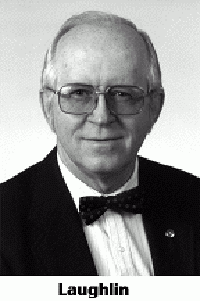Cornell alumnus who helped develop Dawn and Downy endows named professorship in physical chemistry
By David Brand
Cornell alumnus Robert G. Laughlin, whose research at Procter & Gamble Co. has contributed to a number of well-known household products, has donated $2.5 million to endow a new named professorship in the university's Department of Chemistry and Chemical Biology.
The professorship will be called the Frank and Robert Laughlin Chair of Physical Chemistry. It also is named for Laughlin's late father, Frank, a high school teacher in Sullivan, Ind.
Some of the well-known household products to which Robert Laughlin's research at Procter & Gamble has contributed are Dawn liquid dishwashing detergent, Pert Plus shampoo/conditioner and Downy fabric softener.
The first appointment to the chair — a visiting professor — is planned for next year. Laughlin, who retires from Procter & Gamble in October after 43 years there as a research chemist, most recently as a research fellow, stated his hope that the position ultimately will be filled by a permanent faculty member who is an expert and an innovator in experimental phase science. This is an important subdiscipline of the field of physical chemistry which has been critically important to the development of modern surfactant-based technologies, such as shampoos, bar soaps and detergents. Currently, Cornell does not have an experimentalist in this area.
"It is my preference that this position be awarded to a new or existing faculty member whose interests and expertise are in these areas but whose interests and expertise will ideally also include the theoretical aspects of phase science," he said.
Laughlin earned his bachelor of science in chemistry from Purdue University in 1951 and received his Ph.D. in organic chemistry in 1955 from Cornell. In 1956, after a year as a post-doctoral student at Yale University, he joined the research staff of Procter & Gamble. During the 1970s and 1980s his research shifted from organic chemistry to phase science and physical chemistry, specializing in surfactant-based technologies.
He holds 26 patents and publishes and lectures extensively. His 1994 book, The Aqueous Phase Behavior of Surfactants, is now in its second printing.
Laughlin said that the reason for the gift to Cornell is that phase science, solution physical chemistry and classical colloid science, disciplines that generated new technologies and provided scores of commercial products in the first half of the 20th century, have virtually disappeared from the curricula of U.S. universities. Cornell, he said, "is the logical place to locate a new beginning in experimental phase science."
At the turn of the century, Cornell was one of only two U.S. universities with a professorship in physical chemistry. The university achieved preeminence in this then-new field through the work of faculty members such as Wilder D. Bancroft, whose research spawned major developments in geology, ceramics and metallurgy.
Today's Cornell chemistry faculty includes a Nobel laureate, six members of the National Academy of Sciences, 10 fellows of the American Academy of Arts and Sciences and seven fellows of the American Association for the Advancement of Science.
Media Contact
Get Cornell news delivered right to your inbox.
Subscribe